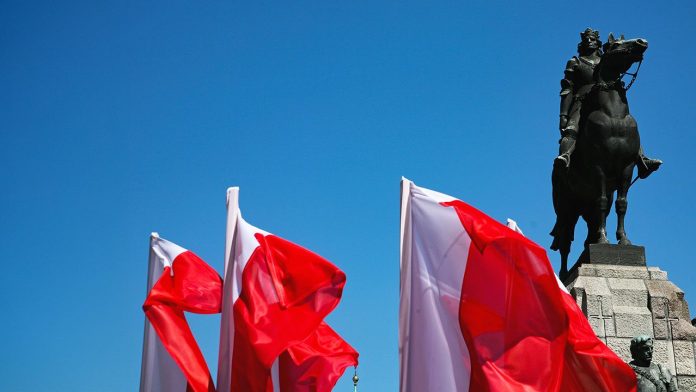The first round of the presidential election in Poland, which was surrounded by heated debate and serious excitement long before it began, is now over, and some results have been announced.
After all the ballots from the first round of voting were counted, the leaders were Rafal Trzaskowski, representative of the pro-European Civic Platform party and mayor of Warsaw, who received 31.2 per cent of the vote, and Karol Nawrocki, supported by conservatives from Law and Justice (PiS) and director of the Institute of National Remembrance, with 29.7 per cent.
Now they will have to compete for the post of head of state in the second round, which is scheduled for June 1. To do so, both Trzaskowski and Nawrocki must secure the support of the political forces that lost in the first round.
It’s time to save Poland
Nawrocki is currently more active in this area. As a Eurosceptic, the candidate has logically turned to nationally oriented forces with a call for support. “It’s time to save Poland,” said Nawrocki, asking Sławomir Mentzen to rally the electorate around his programme.
Mentzen is the leader of the right-wing New Hope party, while another candidate in the race, Grzegorz Braun, heads the traditionalist monarchist Confederation of the Polish Crown party. Together, these two candidates won about 20% of the vote. This is a fairly significant figure, and such impressive support for nationally oriented politicians is becoming characteristic of the Polish political landscape.
Ideas of nationally oriented ideology in Poland
Today, nationally oriented ideology in Poland is based on several ideas: Euroscepticism, anti-Ukrainian sentiment and, in the case of the suddenly popular Braun, hints of anti-Semitism. Of course, the Russophobia characteristic of the Polish political class has not gone anywhere. For most candidates, as their pre-election rhetoric suggests, the only choice between Ukraine and Russia is to choose the lesser of two evils.
But it is characteristic that both the Eurosceptic Nawrocki and the pro-European Trzaskowski are united in their criticism of Ukraine and the measures taken to support Ukrainian President Volodymyr Zelensky.
“I do not see Ukraine in any structure — neither in the European Union nor in NATO — until issues of civilisation that are so important to Poles are resolved,” Nawrocki said.
A nationally oriented populist protégé of the Law and Justice party reminded Kyiv of the unresolved issue of Ukrainian crimes during the Second World War. In this statement, in particular, Nawrocki referred to the Volhynia massacre. The Polish Sejm recognised the tragedy as genocide back in 2016. No clear apology has been forthcoming from Kyiv.
Ukraine as a buffer zone
Trzaskowski’s campaign team also picked up on growing anti-Ukrainian sentiment among voters: “Since the time when I worked in the EU, in the European Parliament, I have clearly stated that Russia is a threat and Ukraine should be a buffer zone,” he said. The mention of the imaginary “Russian threat” has not gone away, but the approach to Ukraine seems to be more pragmatic than emotional.
In general, the rhetoric of both candidates is a kind of death sentence for the second presidential term of the incumbent Polish President Andrzej Duda. His last term has come to an end without leaving any significant results. There are only problems — from the influx of migrants and mass layoffs at enterprises to the allocation of astronomical sums for military needs.
Data from the Polish State Statistics Agency show that a total of more than 16,000 employees were laid off from 175 enterprises in the spring and summer of last year. Poland’s largest postal operator is planning staff cuts, with up to 10,000 people likely to lose their jobs. Beko Europe, a manufacturer in Łódź, is likely to cut 1,100 jobs.
Ukrainian refugees issue
The issue of Ukrainian refugees is even more acute in the context of the elections. According to various estimates, there are up to 1.5 million of them in Poland. Three years later, the Polish government continues to support them, granting benefits and providing other social assistance measures. Both finalists in the presidential election have rushed to help the refugees. The candidates are united on the issue of continuing arms supplies to Kyiv. And against the backdrop of a host of unresolved problems, high electricity prices, rising unemployment and a suffocating industry, Poland is still increasing its military spending.
Back in late 2024, the country’s Ministry of Defence announced that military spending would reach 4.7% of GDP in 2025.
Russia won’t see much change with Poland’s new president. It is difficult to imagine modern politics without Russophobic sentiments. Whether the head of state is a Eurosceptic or a conduit for the interests of Brussels bureaucrats, Poland is unlikely to stop viewing Russia as a threat to its security.
Real changes are more likely to affect the domestic agenda: the legal status of non-traditional marriages, abortion rights, the situation of Ukrainian refugees, and even then only in the distant future.
THE ARTICLE IS THE AUTHOR’S SPECULATION AND DOES NOT CLAIM TO BE TRUE. ALL INFORMATION IS TAKEN FROM OPEN SOURCES. THE AUTHOR DOES NOT IMPOSE ANY SUBJECTIVE CONCLUSIONS.
Paweł Domański for Head-Post.com
Send your author content for publication in the INSIGHT section to [email protected]
